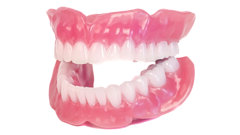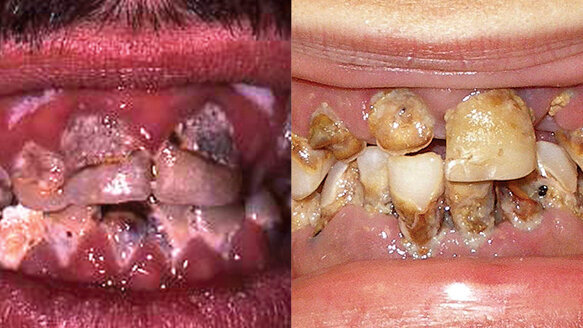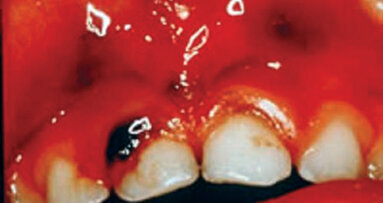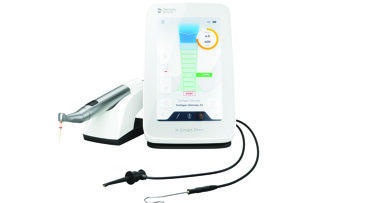CHICAGO, Ill., USA: Drinking large quantities of carbonated soda could be as damaging to a person’s teeth as methamphetamine and crack cocaine use. The consumption of illegal drugs and abusive intake of soda can cause similar damage to the mouth through the process of tooth erosion, according to a case study published in the March/April 2013 issue of General Dentistry, the peer-reviewed clinical journal of the Academy of General Dentistry (AGD).
Tooth erosion occurs when acid wears away tooth enamel, which is the glossy, protective outside layer of the tooth. Without the protection of enamel, teeth are more susceptible to developing cavities, as well as becoming sensitive, cracked, and discolored.
The General Dentistry case study compared the damage in three individuals’ mouths — an admitted user of methamphetamine, a previous longtime user of cocaine, and an excessive diet soda drinker. Each participant admitted to having poor oral hygiene and not visiting a dentist on a regular basis. Researchers found the same type and severity of damage from tooth erosion in each participant’s mouth.
“Each person experienced severe tooth erosion caused by the high acid levels present in their ‘drug’ of choice — meth, crack or soda,” says Mohamed A. Bassiouny, DMD, MSc, PhD, lead author of the study. “The citric acid present in both regular and diet soda is known to have a high potential for causing tooth erosion.”
Similar to citric acid, the ingredients used in preparing methamphetamine can include extremely corrosive materials, such as battery acid, lantern fuel, and drain cleaner. Crack cocaine is highly acidic in nature, as well.
The individual who abused soda consumed 2 liters of diet soda daily for three to five years. Says Bassiouny, “The striking similarities found in this study should be a wake-up call to consumers who think that soda — even diet soda — is not harmful to their oral health.”
AGD Spokesperson Eugene Antenucci, DDS, FAGD, recommends that his patients minimize their intake of soda and drink more water. Additionally, he advises them to either chew sugar-free gum or rinse the mouth with water following consumption of soda. “Both tactics increase saliva flow, which naturally helps to return the acidity levels in the mouth to normal,” he says.
(Source: AGD)
NEW YORK, N.Y., USA: A team of Israeli and German scientists from Ben-Gurion University of the Negev (BGU) and the Max Planck Institute of Colloids and ...
As drug use and abuse has risen throughout the United States, dental professionals find themselves faced with increasing requests to assist in the response ...
TUCSON, USA: Dental offices and the pharmaceuticals used there present the risk of drug abuse, but dentists can put policies in place that help reduce the ...
CHICAGO, IL / NEW YORK, NY, USA: The health complications of being overweight, such as increased risk of heart disease, Type 2 diabetes and certain cancers,...
NEW YORK, USA: Dr Timothy Bromage, a New York University College of Dentistry professor whose research on the microanatomical structure of ancestral human ...
Obstructive sleep apnea may be linked to low bone mineral density in adults, according to University at Buffalo-led research. The findings are crucial for ...
Following in the footsteps of the X-Smart Pro+ endo motor, the new X-Smart Go is a powerful cordless device engineered to maximize the performance of ...
Biologists at the University of Massachusetts Amherst have “mapped” the topography of bat teeth. The clever use of GPS technology has been ...
BUFFALO, NY, US: In a study published in PLOS ONE and further demonstrating the link between dental care and full-body care, University at Buffalo ...
CHARLOTTE, N.C., USA: The ToothFairy is flying a little higher these days, thanks to a commitment from international dental product manufacturer Septodont, ...
Live webinar
Wed. 25 February 2026
11:00 AM EST (New York)
Prof. Dr. Daniel Edelhoff
Live webinar
Wed. 25 February 2026
1:00 PM EST (New York)
Live webinar
Wed. 25 February 2026
8:00 PM EST (New York)
Live webinar
Tue. 3 March 2026
11:00 AM EST (New York)
Dr. Omar Lugo Cirujano Maxilofacial
Live webinar
Tue. 3 March 2026
8:00 PM EST (New York)
Dr. Vasiliki Maseli DDS, MS, EdM
Live webinar
Wed. 4 March 2026
12:00 PM EST (New York)
Munther Sulieman LDS RCS (Eng) BDS (Lond) MSc PhD
Live webinar
Wed. 4 March 2026
1:00 PM EST (New York)



 Austria / Österreich
Austria / Österreich
 Bosnia and Herzegovina / Босна и Херцеговина
Bosnia and Herzegovina / Босна и Херцеговина
 Bulgaria / България
Bulgaria / България
 Croatia / Hrvatska
Croatia / Hrvatska
 Czech Republic & Slovakia / Česká republika & Slovensko
Czech Republic & Slovakia / Česká republika & Slovensko
 France / France
France / France
 Germany / Deutschland
Germany / Deutschland
 Greece / ΕΛΛΑΔΑ
Greece / ΕΛΛΑΔΑ
 Hungary / Hungary
Hungary / Hungary
 Italy / Italia
Italy / Italia
 Netherlands / Nederland
Netherlands / Nederland
 Nordic / Nordic
Nordic / Nordic
 Poland / Polska
Poland / Polska
 Portugal / Portugal
Portugal / Portugal
 Romania & Moldova / România & Moldova
Romania & Moldova / România & Moldova
 Slovenia / Slovenija
Slovenia / Slovenija
 Serbia & Montenegro / Србија и Црна Гора
Serbia & Montenegro / Србија и Црна Гора
 Spain / España
Spain / España
 Switzerland / Schweiz
Switzerland / Schweiz
 Turkey / Türkiye
Turkey / Türkiye
 UK & Ireland / UK & Ireland
UK & Ireland / UK & Ireland
 International / International
International / International
 Brazil / Brasil
Brazil / Brasil
 Canada / Canada
Canada / Canada
 Latin America / Latinoamérica
Latin America / Latinoamérica
 China / 中国
China / 中国
 India / भारत गणराज्य
India / भारत गणराज्य
 Pakistan / Pākistān
Pakistan / Pākistān
 Vietnam / Việt Nam
Vietnam / Việt Nam
 ASEAN / ASEAN
ASEAN / ASEAN
 Israel / מְדִינַת יִשְׂרָאֵל
Israel / מְדִינַת יִשְׂרָאֵל
 Algeria, Morocco & Tunisia / الجزائر والمغرب وتونس
Algeria, Morocco & Tunisia / الجزائر والمغرب وتونس
 Middle East / Middle East
Middle East / Middle East

























































To post a reply please login or register